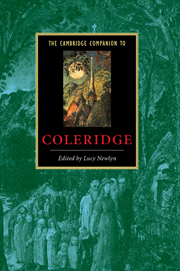11 - The philosopher
from Part II - Discursive modes
Published online by Cambridge University Press: 28 May 2006
Summary
Is Coleridge philosophically interesting? His philosophical output was prodigious and remarkably untidy. His letters abound in comments and judgements on his philosophical reading; they document his current theoretical allegiances and his plans to publish them. His Notebooks, kept throughout his life, extend this activity into private areas safe from public accountability, showing a corresponding increase in adventurousness and ambition but fewer signs of decisions being taken and consistent positions being occupied. The fascinating Notebook entries are 'acts of obedience to the apostolic command of Trying all things' (CNiii, 3881). Early publications like the 1795 Lectures on Politics and Religion reveal a young intellectual engrossed by the possible philosophical justifications for radical sentiments in politics that he considers congruent with his religious beliefs. At that time those beliefs were Unitarian, mapped out in his poetry of the time (especially 'The Destiny of Nations') as a convergence of different knowledges appropriate to a God who shared his aspects amongst different religions. Unitarianism fitted with Coleridge's championing of intellectual enfranchisement, however sceptical he was growing of Jacobin enlargements of the political franchise in France. In the Prospectus to the Watchman in 1796, he equated communicative and political action, arguing that 'the forms of Government . . . are but the Shadows, the virtue and rationality of the people at large are the substance, of freedom . . .We actually transfer the Sovereignty to the People, when we make them susceptible of it' (Watchman, 4-5). This repeats ideas central to William Godwin's topical Enquiry Concerning Political Justice (1793) whose idealistic rationalism must also have nurtured the transcendental tendency in Coleridge, as much as did his growing dissatisfaction with the Hobbesian psychology of empiricism popularised by John Locke and developed most exhaustively by David Hartley.
- Type
- Chapter
- Information
- The Cambridge Companion to Coleridge , pp. 170 - 186Publisher: Cambridge University PressPrint publication year: 2002
- 23
- Cited by

